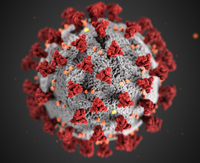 The coronavirus disease 2019 (COVID-19) pandemic continues to be a public health concern. For this reason, we are focusing this issue on the latest health and research updates to help you better navigate the reliable resources available. We commend you for keeping your community informed.
The coronavirus disease 2019 (COVID-19) pandemic continues to be a public health concern. For this reason, we are focusing this issue on the latest health and research updates to help you better navigate the reliable resources available. We commend you for keeping your community informed.
Featured Health Information
Latest Public Health Information From the CDC
Find information from the Centers for Disease Control and Prevention (CDC) on:
- How to prepare and protect yourself and others.
- What to do if you are sick or caring for someone.
- Resources you can use to educate your community.
Latest Research Information From the NIH
Why Social Distancing Is a Must
Social distancing remains one of the best ways we have to slow the silent spread of this virus and flatten the curve of the COVID-19 pandemic. That’s because researchers have discovered that many people can carry the novel coronavirus without showing any of the typical symptoms of COVID-19: fever, dry cough and shortness of breath. This will give our health care professionals, hospitals and other institutions more valuable time to prepare, protect themselves and aid the many people whose lives may be on the line from this coronavirus.
How Workers Responding to COVID-19 Can Protect Their Health
This website from the National Institutes of Health (NIH) has important educational resources for workers responding to the spread of COVID-19. It contains health and safety resources for workers or volunteers who may be at risk of exposure.

COVID-19 Social Media Resources
The NIH has developed a new page featuring COVID-19 social media resources, with content from across the NIH’s 27 Institutes and Centers. The suggested posts on this page cover a range of topics, from the latest NIH research on COVID-19, to tips on social distancing, staying active and more. Many of the posts include corresponding images and infographics.
Join us in posting these messages to Facebook and Twitter.
COVID-19: Potential Implications for Individuals With Substance Use Disorders
As people across the United States and the rest of the world contend with COVID-19, the community should be alert to the possibility that it could hit some populations with substance use disorders particularly hard. Learn more here.
Supporting Mental Health During the Pandemic
A traumatic event, such as the COVID-19 pandemic, is a shocking and scary experience that can affect someone emotionally and physically. This page from the NIH’s National Institute of Mental Health is dedicated to informing you about ways to cope with fear, anxiety and stress.
Resources From Other Federal Agencies for You and Your Community
Emergencies happen everywhere, and every member of the community can prepare. Whether you are a parent or work with children or teens, Ready Kids has tools and information such as games, planning resources and lists you can use to help them before, during and after an emergency happens.
What Do Older Adults and People With Disabilities Need To Know?
People who are age 65 or older are more likely to have serious COVID-19 illness. This may be because immune systems change with age, making it harder to fight off diseases and infection. Older adults also are more likely to have underlying health conditions that make it harder to cope with and recover from illness. Learn more here.
Beware of Fraud Schemes Related to COVID-19
The U.S. Department of Health and Human Services Office of Inspector General is alerting the public about fraud schemes related to COVID-19. Scammers are offering COVID-19 tests to Medicare beneficiaries in exchange for personal details, including Medicare information. However, the services are unapproved and illegitimate. Learn more here.
This page from the Federal Emergency Management Agency helps the public distinguish between rumors and facts regarding the response to the COVID-19 pandemic. Rumors can easily circulate within communities during a crisis. Learn more here.
COVID-19 Behavioral Health Resources
The federal government continues to take steps to protect Americans’ physical and behavioral health in response to the COVID-19 pandemic. The resources in this collection were created by federal agencies and their partners to help health care providers, caregivers and the general population prepare for and manage the negative behavioral health effects that can accompany a public health emergency.
Shopping for Food During the COVID-19 Pandemic: Information for Consumers
As grocery shopping remains a necessity during this pandemic, many people have questions about how to shop safely. This page from the Food and Drug Administration provides practical tips to protect yourself, grocery store workers and other shoppers.





